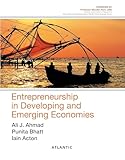Entrepreneurship in developing and emerging economies
Material type: TextPublication details: New Delhi Atlantic publishers & distributors 2024Description: 241pISBN: 9788126936007Subject(s): Developing countries | Entrepreneurship | Entrepreneurship developing countries | IndustryDDC classification: 658.421 Summary: The predominant understanding of enterprise and entrepreneurship (E & E) has emerged from the perspective of industrialised and economically developed countries, largely ignoring emerging and developing economies (EDEs). Further, business and management students are considered ideal for innovating business ideas unlike students of law, physics or literature. Therefore, the benefits of E & E education fail to impact a vast majority of students from EDEs. This book breaks away from these two trends, presenting alternative pathways to students for 'practicing' (as opposed to 'just learning' about) E & E. The book uses non-technical language and introduces over 50 illustrative cases on enterprise and entrepreneurship from EDEs, aiding students to gain insights into the pre-start-up, start-up and growth phases of the entrepreneurial process
TextPublication details: New Delhi Atlantic publishers & distributors 2024Description: 241pISBN: 9788126936007Subject(s): Developing countries | Entrepreneurship | Entrepreneurship developing countries | IndustryDDC classification: 658.421 Summary: The predominant understanding of enterprise and entrepreneurship (E & E) has emerged from the perspective of industrialised and economically developed countries, largely ignoring emerging and developing economies (EDEs). Further, business and management students are considered ideal for innovating business ideas unlike students of law, physics or literature. Therefore, the benefits of E & E education fail to impact a vast majority of students from EDEs. This book breaks away from these two trends, presenting alternative pathways to students for 'practicing' (as opposed to 'just learning' about) E & E. The book uses non-technical language and introduces over 50 illustrative cases on enterprise and entrepreneurship from EDEs, aiding students to gain insights into the pre-start-up, start-up and growth phases of the entrepreneurial process
| Item type | Current library | Collection | Call number | Status | Date due | Barcode |
|---|---|---|---|---|---|---|
 BK
BK
|
Kannur University Central Library Stack | Stack | 658.421 AHM/E (Browse shelf (Opens below)) | Available | 68666 |
Browsing Kannur University Central Library shelves, Shelving location: Stack, Collection: Stack Close shelf browser (Hides shelf browser)

|

|

|

|

|

|

|
||
| 658.42 KHA/E Entrepreneurial development | 658.42 KHA/E Entrepreneurial development | 658.42 MAL/C Corporate governance | 658.421 AHM/E Entrepreneurship in developing and emerging economies | 658.421 DES/D Dynamics of entrepreneurial development and management | 658.421 DES/D Dynamics of entrepreneurial development and management | 658.421 HIS/E Entrepreneurship |
The predominant understanding of enterprise and entrepreneurship (E & E) has emerged from the perspective of industrialised and economically developed countries, largely ignoring emerging and developing economies (EDEs). Further, business and management students are considered ideal for innovating business ideas unlike students of law, physics or literature. Therefore, the benefits of E & E education fail to impact a vast majority of students from EDEs. This book breaks away from these two trends, presenting alternative pathways to students for 'practicing' (as opposed to 'just learning' about) E & E. The book uses non-technical language and introduces over 50 illustrative cases on enterprise and entrepreneurship from EDEs, aiding students to gain insights into the pre-start-up, start-up and growth phases of the entrepreneurial process


There are no comments on this title.